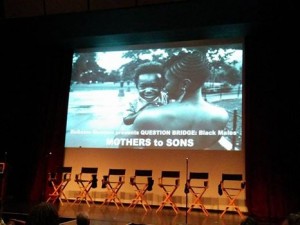 How often do we truly put ourselves in the space to encounter the other in our world? How often do we truly break down the other and see the unity that shines through? These questions have been on mind since I went to a very special event this past week at the DuSable Museum of African-American History in the Hyde Park neighborhood of Chicago. The event was a dialogue between mothers and between mothers and sons on raising young men in the African-American community. I was there in an official capacity representing my employer, The Jewish Council on Urban Affairs, yet I also was profoundly humbled by the evening.
How often do we truly put ourselves in the space to encounter the other in our world? How often do we truly break down the other and see the unity that shines through? These questions have been on mind since I went to a very special event this past week at the DuSable Museum of African-American History in the Hyde Park neighborhood of Chicago. The event was a dialogue between mothers and between mothers and sons on raising young men in the African-American community. I was there in an official capacity representing my employer, The Jewish Council on Urban Affairs, yet I also was profoundly humbled by the evening.
As I sat in that intimate space and listened to the open, frank and sometimes humorous but oftentimes challenging conversation, I gained a deeper understanding of a community that is not directly mine. I listened to the stories of racism that are all pervasive and to the stories of triumphs over incredible difficulties. I heard the voices of women who had fought and continue to fight so hard to provide a context of success for their sons and I heard the voices of those sons expressing overwhelming gratitude. Through it all I thought of the quote from the Austrian Jewish philosopher, Martin Buber, in his class work, I and Thou:
“When I confront a human being as my You and speak the basic word I-You to him, then he is no thing among things nor does he consist of things.
He is no longer He or She, limited by other Hes and Shes, a dot in the world grid of space and time, nor a condition that can be experienced and described, a loose bundle of named qualities. Neighborless and seamless, he is You and fills the firmament. Not as if there were nothing but he, but everything else lives in his light.
Even as a melody is not composed of tones, nor a verse of words, nor a statute of lines – one must pull and tear to turn a unity into a multiplicity – so it is with the human being to whom I say You. I can abstract from him the color of his hair or the color of his speech or the color of his graciousness; I have to do this again and again; but immediately he is no longer You.”
All too often it seems we exist in a world of transactional relationships. I ask you how you are not because I want to gain a greater understanding of who you are but because it is a means to an end of wanting something from you. Most of our interactions, if not almost all, of our interactions on a daily basis fall into a category of transactional relationships. There are glimpses though, moments in time, where we come to appreciate Buber’s insight, when we can truly see the other as a full “You” absent anything we want from them. The evening at the DuSable Museum was one of those moments.
A point for further reflection that I will be thinking about in the coming weeks and months ahead is how do we maximize our relational interactions and, perhaps more importantly, how do we discover the relational within the transactional interactions that we will continue to have regularly?












